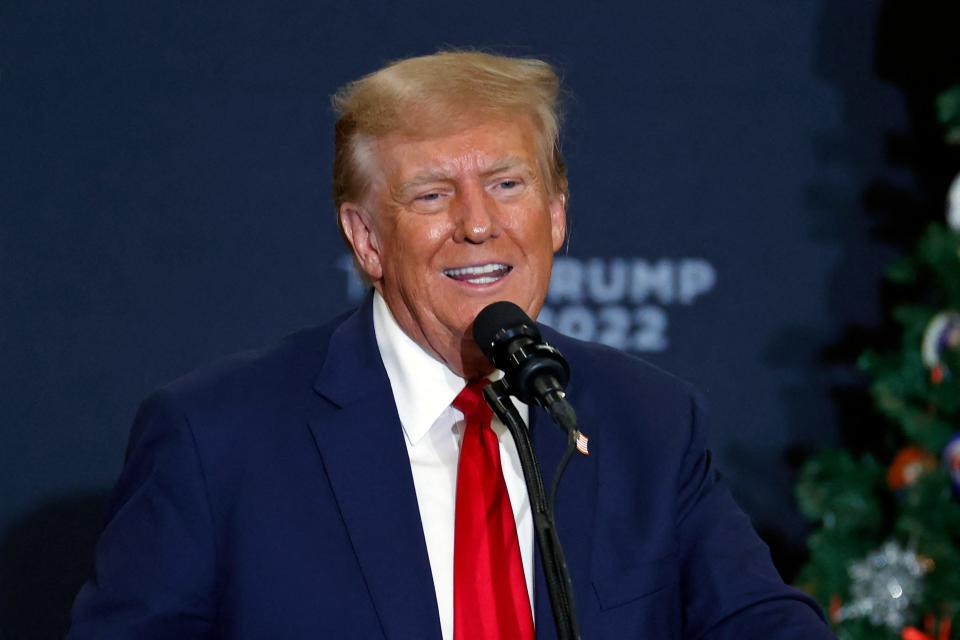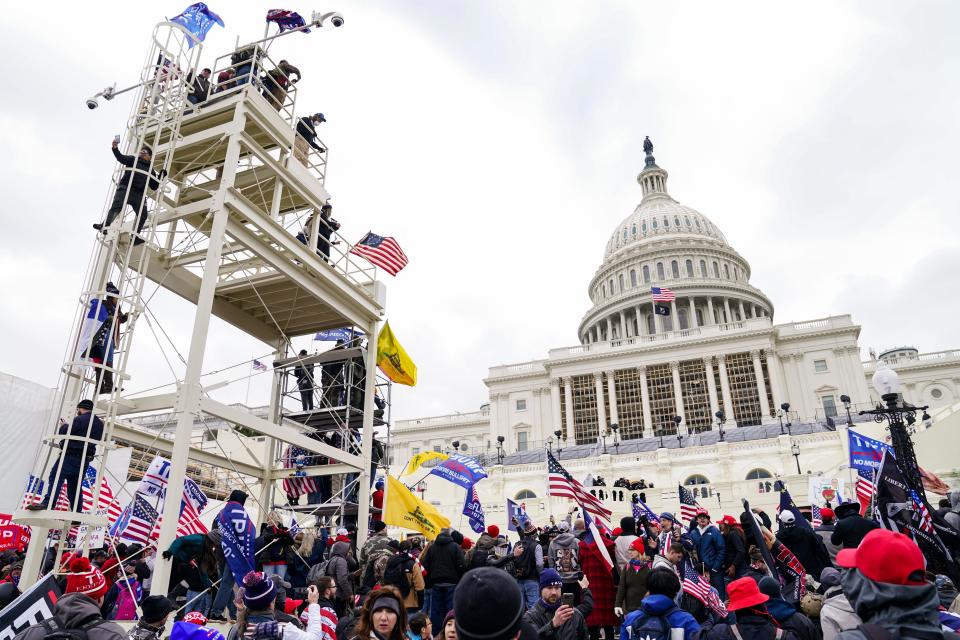Can Trump be disqualified in every state? Chaos may follow Supreme Court ballot ruling.
- Oops!Something went wrong.Please try again later.
The Supreme Court will hear oral arguments Thursday about its latest dilemma: Should former President Donald Trump be forever disqualified from the presidency or can it find a way to sidestep the Constitution.
Section 3 of the 14th Amendment says anyone who has taken the oath of office to defend the Constitution and then engages in insurrection may never hold the high office again. Highly respected legal scholars contend Trump is disqualified because of his participation in the assault on the Capitol on Jan. 6, 2021.
Yet Trump is already running for the 2024 GOP nomination and has won primary events in Iowa and New Hampshire. And the former president has intimated that “bedlam” might ensue if he is kept off the ballot.
The case now before the Supreme Court stems from Trump’s appeal to a 5-4 decision by the Colorado Supreme Court to disqualify him because of Section 3.

Will Supreme Court choose the Constitution or Donald Trump?
Given the oath justices take to defend the Constitution, as well as the deference the high court typically accords to state courts on most election matters, it seems like a slam-dunk that the ruling will favor Colorado’s decision.
But that is not entirely clear, and there also is the issue of where it would leave the other states.
Trump's 2020 election lies impact 2024: Trump paid me to find voter fraud. Then he lied after I found 2020 election wasn't stolen.
Here are the words of Section 3:
“No person shall be a Senator or Representative in Congress, or elector of President and Vice-President, or hold any office, civil or military, under the United States, or under any State, who, having previously taken an oath, as a member of Congress, or as an officer of the United States, or as a member of any State legislature, or as an executive or judicial officer of any State, to support the Constitution of the United States, shall have engaged in insurrection or rebellion against the same, or given aid or comfort to the enemies thereof.”
Unless the court declares its eventual decision to be applicable nationwide, another form of chaos could prevail with each state making its own ruling on ballot access.

Frequently cited on this issue is "The Sweep and Force of Section Three," a thoughtful article by law professors William Baude and Michael Stokes Paulsen, members of the conservative Federalist Society.
“The Constitution is not optional and Section Three is not an optional part of the Constitution," they write. “Importantly, it is also wrong to shrink from applying Section Three on grounds of ‘democracy,’ whether on the premise that Section Three should be ignored or narrowly construed because it limits who voters may choose, or on the premise that only the voters should enforce Section Three.”
Baude and Paulsen parenthetically note the irony of those invoking democracy as a defense for their actions in attempting to overthrow constitutional order at the Capitol. The lawyers contend that many officials participated in the insurrection and should be held accountable.
“Donald Trump is at the top of the list of Section Three disqualifications, but the list does not end with him,” they conclude.
SCOTUS should uphold Trump ballot ban: Supreme Court should ban Trump from the ballot. And not worry about the political fallout.
Will Trump be disqualified from running in every state?
Capital University constitutional law professor Mark Brown said the court will most likely find a way to avoid an outright nationwide ban against Trump.
“My gut tells me they will not disqualify Trump, even though I think they should,” he said in an interview. “They could say Section 3 does not apply to the president. They also could say some kind of formal fact-finding is needed to determine if an insurrection occurred. Or they could leave it to the other states to decide for themselves who will be on their ballots. “
Additionally, he added, there is a question of ballot access versus holding office: “We’ve never seen this before, so it’s going to be interesting.”
Trump ballot ban defies democracy: Banning Trump from the 2024 ballot defies democracy. Courts shouldn't usurp voters' rights.
Section 3 of the amendment was adopted after the Civil War and aimed at preventing rebellious Confederates from seeking seats in Congress and other high offices after the war ended.
It’s important to consider that this prohibition is not a statute passed by a hyperpartisan Congress. The very wording of the amendment must have been approved by a two-thirds vote of both chambers and then ratified by three-fourths of the states. It is fundamental to the rule of law.
Opinion alerts: Get columns from your favorite columnists + expert analysis on top issues, delivered straight to your device through the USA TODAY app. Don't have the app? Download it for free from your app store.
In the August Atlantic edition, Harvard law professor Laurence Tribe and retired federal Judge J. Michael Luttig wrote: “Section 3’s disqualification clause has by no means outlived its contemplated necessity, nor will it ever, as the post-Civil War Framers presciently foresaw. To the contrary, this provision of our Constitution continues to protect the republic from those bent on its dissolution.”
Public perceptions of the Supreme Court vary, often because of seemingly political decisions such as Bush v. Gore settling the presidential election of 2000, or controversial rulings such as the Dobbs v. Jackson Women's Health Organization decision overturning the Roe v. Wade ruling on abortions.

Pew Research Center findings indicate favorable ratings of the nation's highest court have declined 26 percentage points since 2020, and Pew’s most recent survey shows for the first time in its polling since 1987 that the public views the high court "significantly more negative than positive."
The Supreme Court is the third equal leg of American governance. By virtue of the lifetime tenure of its justices, it is the only branch shielded from partisanship or public pressure. The decision in this dispute ought to be about defending the rule of law as it is written and without fear or favor, or legalistic hairsplitting.
Baude and Paulsen concluded “that those who possess the power and duty to apply and enforce Section Three have a constitutional responsibility to do so, fairly but vigorously.”
In other words, the Supreme Court should simply do the right thing and decide this issue for the nation.

William DiMascio is a retired journalist who lives in Upper Arlington, Ohio. This column first published in The Columbus Dispatch.
You can read diverse opinions from our Board of Contributors and other writers on the Opinion front page, on Twitter @usatodayopinion and in our daily Opinion newsletter.
This article originally appeared on The Columbus Dispatch: Can Trump be on ballot? Supreme Court call is about more than Colorado

